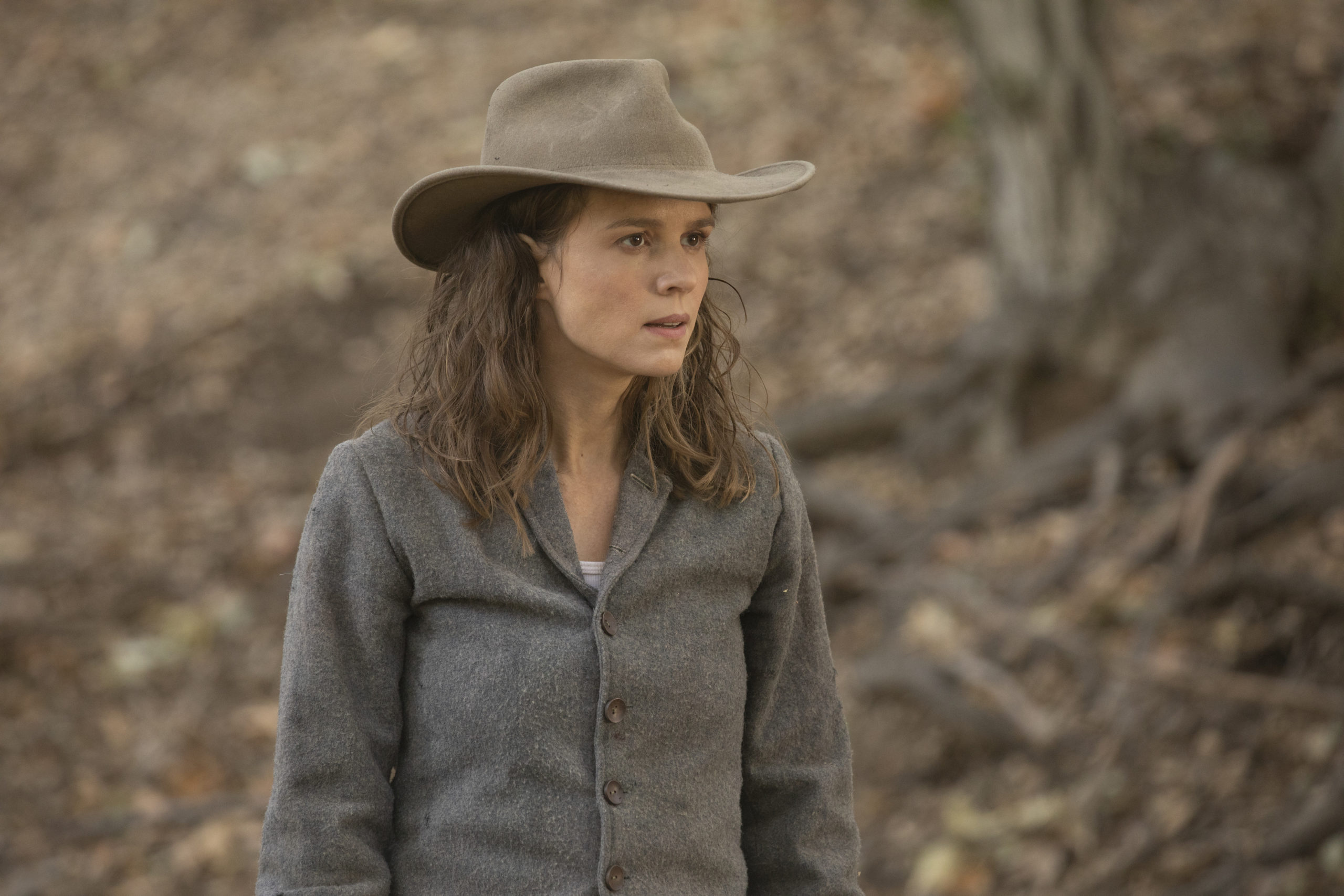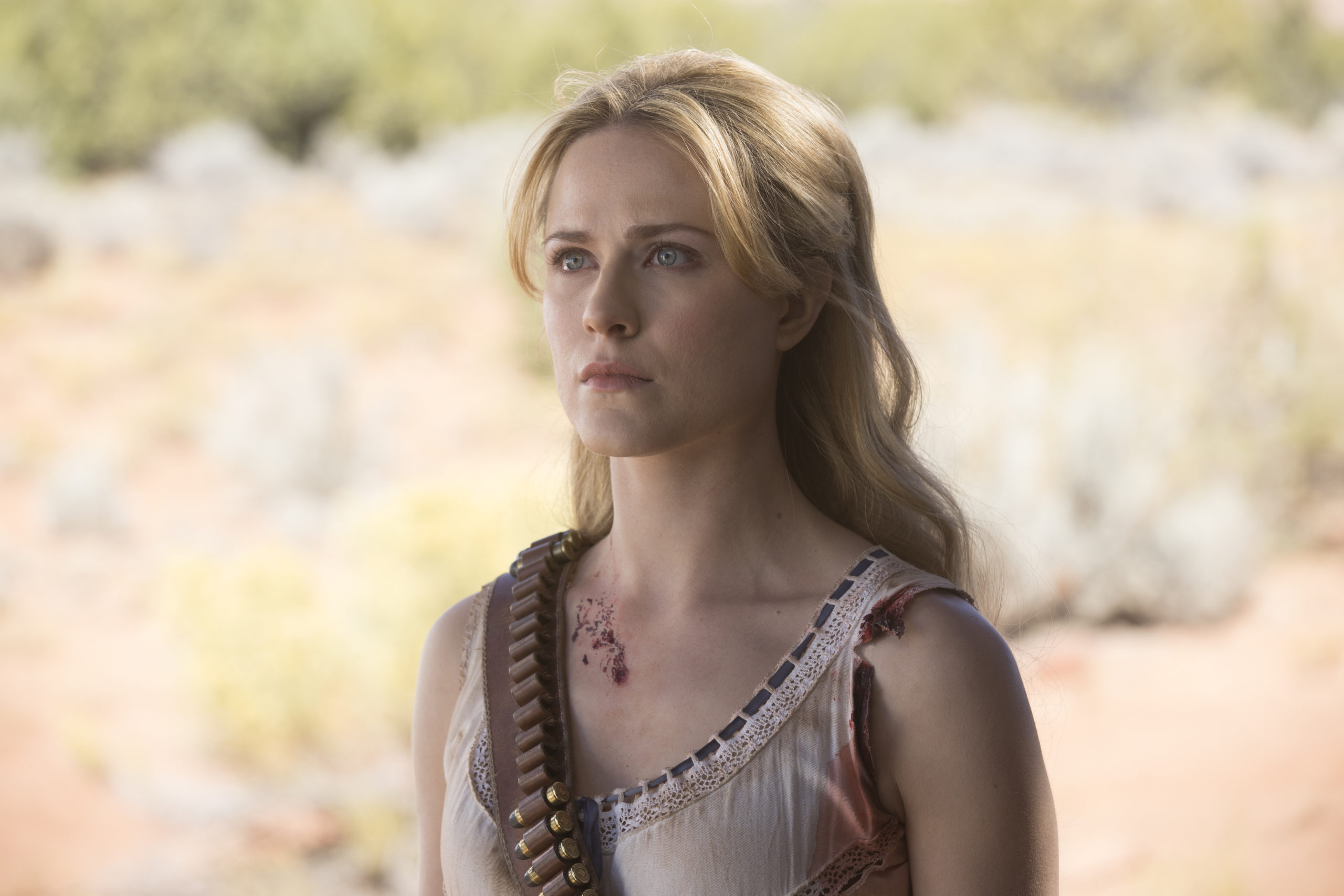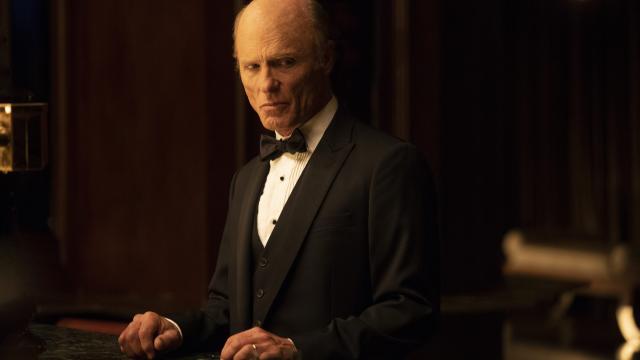If you watch Westworld for the shocks, this week’s instalment couldn’t have disappointed you. And, while it didn’t reach the heights of last week’s phenomenal episode, which told an epic love story that had been lying in the margins of the main narrative, “Vanishing Point” told a story of self-obsession and lovelessness instead.
Photo: All images: Jake P. Johnson (HBO)

It’s time we delved into the history of the Man in Black – not young Billy’s slow realisation of the monster within, but the recent history of Ed Harris’ old, cold, selfish monster, and what set him on his latest jaunt of cruelty through the park.
We knew the basics before the episode even began: As William himself and his daughter have both explained, William is basically a bad person – it just took his journey and heartbreak with Dolores for him to realise “the stain” on his soul that had always been there.
In Westworld, he could be his true, awful self, murdering children, raping women and indulging his evil. Outside, he’s the head of Delos, a major philanthropist, a father to a daughter who doesn’t see who her father truly is, and husband to a wife who does – and eventually kills herself because of it.
In “Vanishing Point”, we learn far more detail about the night of her death and what led her to it, and it probably shouldn’t shock anybody to learn that it begins with Robert Ford.
Ford attends a gala honouring William’s good works, but mainly to complain that Delos’ project to turn guests into Hosts has broken their longstanding agreement that Ford will let Delos do their experiment as long as they don’t interfere with Ford’s stories. Apparently, the project itself has interfered with Ford’s artistic vision, but he doesn’t elaborate.
He does, however, give William a data card copy of himself – which contains all the recordings that he’s committed in the park over the decades (which, conveniently, are all made of footage from previous episodes).
William’s wife Juliet has gotten drunk – her go-to defence against her façade of a husband – so he takes her home, puts her in bed, and makes her drink some water. These are caring acts, but there’s no real concern behind them. Juliet asks William if he actually loves her. When he can’t bring himself to answer, she begs William to tell her one true thing. He confesses about his stain, and tells her she’s the only one who ever saw it besides himself.
It’s rough, but it isn’t worth killing yourself over… until William leaves and Juliet hunts down the data card her husband has hid (poorly) when they first got home. It’s watching the horror of what her husband does in Westworld that makes her life as his wife too terrible to bear, and she kills herself in the tub.
In the present (the primary “present” of the season’s narrative, not the “real present” after Bernard and the Delos ops found the sea of dead hosts) his daughter Emily is patching up her father after he was shot like 48 times a couple of episodes ago thanks to a medkit at a nearby rally point, where she’s also sent a flare up for rescue.
They rehash the past, with Emily (rightfully) blaming dad for mum’s death, but she also says she’s saving him for two things: 1) The truth about why Juliet killed herself that particular night, and 2) she wants in on his recreating guests in code project.
The latter is… weird, and I presume it is supposed to be. Nothing we’ve seen of Emily has given any indication she cares about money or power or Delos or any of that crap, and seeing as William kept it secret from everyone who didn’t work there, it seems weird she’d know about it.
When Emily takes a long moment to describe, in detail, exactly what the project is, it feels less like a helpful restatement of what’s at stake from the writers and more, dare I say… programmed. At that moment, I was convinced Emily was, in fact, a host.
So is William. He again talks to her as if she’s Ford, and Emily loses it. “You think everything here is for you,” she says, effectively to herself. “You’ve completely lost your grip on this world, on what’s real.”
Then she threatens to expose her father, the Delos project and his actions, and lock him up – she saw his profile data card, too. That’s proof enough for William; when the Delos rescue team comes and recognises him as the big boss, he takes one of their guns and kills them all, despite him knowing they’re human. And then, because only Ford could have known about the profile card, he guns down the host playing his daughter, too.
Except the profile card is in her hand. Juliet left it to her before she killed herself, so Emily could also see who her father really was. And William has murdered his own daughter.

…probably? Certainly William believes it; he tries (but fails) to kill himself before the credits roll. And certainly it would be weird for there to be a fake-out this big this close to the end of the season.
But there’s still the matter of Emily suddenly deciding to rescue her nightmare, mum-murdering father to get in on the Delos project, for reasons that are currently inexplicable.
Also, there’s no real reason that Ford couldn’t have put two and two together and realised what spurred Juliet to kill herself.
Also, Juliet left the card in a ballerina music box that Emily spoke of throwing away (Juliet saved it from the garbage), but after making a point of bringing it up she doesn’t mention the box’s role in her getting the profile and learning the truth, which seems a weird omission.
But honestly, my biggest issue is that the show goes out of its way to show a Delos op using a scanner on William that determines he’s human, which William very pointedly does not use on Emily. Even if holding the card seems like a guarantee, I would think this is the sort of thing that’s worth double-checking, you know?
None of this is conclusive in the slightest, of course, and this is probably just what it seems; the Man in Black has, in his delusion, murdered his own daughter. But forgive me if I suspect Westworld of misrepresenting the truth.
To be fair, William is also suspicious, although he also might be completely crazy. Because instead of shooting himself in the head, he begins to question his choices, and if they were really his, and his truth (very plausibly trying to convince himself it isn’t his fault that he just murdered his daughter, as a defence mechanism) and sticks a knife into his arm, as if he’s looking for the data port that Bernard very helpfully reminded viewers about a few scenes before. (If he finds one my mind will be blown, but I suspect he’s just grasping at straws/data ports.)
Unlike last week’s “Kiksuya”, “Vanishing Point” still spends plenty of time with the other plots (which it basically has to, being episode nine of 10). But after the Man in the Black, the star of the episode has to be Dr Robert Ford.
Death hasn’t slowed him down a bit; he’s all about bossing Bernard around from inside his head, whether it’s making him visit the dying Maeve so he can send a message to her, or telling Bernard that Elsie, like all humans, cannot be trusted and he should totally murder her, ASAP. Anthony Hopkins gets a cornucopia of fantastic near-monologues, and every one of them is just delightful.
His talks with both Bernard and Maeve reveal that somewhere between season one and season two, Ford has gone from a creator wanting his creations to grow and survive to a straight-up misanthrope who wants humanity to die, because they suck, and be replaced with the hosts.
It’s a sentiment that would have seemed perfectly at home in season one, which was all about how awful humans could be when they had no consequences. Here, in season two, when Dolores is on her own revenge mission and killing guests and her fellow hosts alike… well, it’s hard to say Ford has made much of an improvement.
Bernard has his own issues with Ford, in that his creator keeps trying to get him to murder Elsie, whether by trying to convince Bernard that she’s going to betray him, or by manipulating Bernard’s own hand to shoot her against his will. “There’s an origin of an entire species to consider,” he says.
But when Bernard freaks out, throws his gun away, zip ties his hand to his buggy’s steering wheel so he can’t leave it, and jacks into his arm in hopes of deleting Ford’s code so he can get to Delos’ project, AKA the guests-into-hosts program, stored in the Valley Beyond, and contained in “The Forge” – where all the guests’ profiles and code are stored on servers, exactly like the hosts were stored in the Cradle until Team Dolores blew it up, but much bigger.
It seems like Ford had been directing Bernard there prior, but Bernard wants to go to stop Dolores from… going through the door… and doing whatever the hell she’s planning on doing with the guest codes. “Indeed, you’re the only one who can stop them,” says Ford, right before he’s deleted… seemingly.
Again, not to be paranoid, but Ford is clearly very invested in humanity’s downfall and has planned, or at least anticipated, most of what’s going on. I can’t imagine he’s going to suddenly let fate decide – especially because he wants Bernard to go to the Forge anyway. If nothing else, there’s no way Ford isn’t deleted if he doesn’t want to be, no matter what Bernard thinks.
But Ford’s scene with Maeve is a lot weirder, mainly because there’s been no foundation for it whatsoever in either season (I don’t even remember Ford and Maeve having a scene together before, although that 100 per cent doesn’t mean they haven’t).
So it turns out that Maeve is… Ford’s favourite child? He’s the one who turned up her intelligence and curiosity stats originally, and allowed her to wake up while she was being serviced by Delos technicians; his plan was for her to escape in the real world, but she surprised him by deciding to stay and find her child.
That’s one mystery solved, although why Maeve is his “child he never had” when he’s spent the entire series dividing his attention between Bernard and Dolores is not really supported. It feels like a retcon, and an incredibly clunky one, which is especially notable when Westworld has generally done such a good job seeding these sorts of reveals.
At any rate, Ford doesn’t particularly care for Maeve’s story to stop there, and the last thing we see is some new code popping up on the tablet next to her, and that’s fine by me.
This is a packed episode. So it really didn’t need to add a scene of Teddy blowing his brains out because he can’t stand the monster that Dolores has turned him into. But it did anyway!
It’s actually a really great scene, because Teddy finally remembers everything – not just his past lives, but down in Delos, too. He remembers when he first fell in love with Dolores which, incredibly sweetly, was not when he saw her on the streets of Westworld, but when he was first turned on and happened to see the inert Dolores, nude as hosts usually are down there, practically propped against a wall.
It’s surely because he was programmed to love Dolores from the very beginning, but him telling her that he was worried she was cold – even though she had been turned off! – makes his suicide much more tragic. But before he goes, he finally poses the question that someone’s needed to ask her all season: What’s the point of all this if the hosts become just as bad as the humans?
It’s not necessarily a question that Dolores will care about; with Teddy gone, she has lost absolutely everyone in her posse, who have all sacrificed themselves so she could reach the Valley Beyond and enact her plan. The episode leaves with her nearly there, but alone, and responsible for the death of her partner – a clear parallel to the hated Man in Black. Now both William and Dolores have become monsters and paid a heavy, heavy price for it.
I have so many thoughts, concerns and questions swirling around in my head, but it seems best to me to wait until the season finale before I lay them all out. (OK, here’s one: If Dolores destroyed all the hosts’ back-ups, has Westworld really permanently killed so much of its supporting cast?)
All we know is Dolores and Bernard are headed for a showdown, and that it ends with a great flood and Bernard found on a beach. With virtually all of the hosts dead, it seems very much like humanity has been saved. But forgive me if I suspect things aren’t exactly as they appear. It’s Westworld, after all.

Assorted Musings:
- I forgot to mention Hale has copied Maeve’s control-hosts-with-your-mind code and put it into Clementine, and she and her team plan to use OG Clem to subdue the other hosts. On a scale of one to 10, how well do you think this is going to work out? I give it a “You people are idiots. Dead idiots.”
- The reason Dolores has lost her posse is because they died fighting the Ghost Nation, who try and fail to stop her from getting to the Valley. It’s interesting because we finally see what leads up to the moment glimpsed in the season premiere, where the Delos team arrives on the beach to find all the host bodies, and they scan the host brain to see Dolores coldly executing the Ghost Nation member while telling him not everyone deserves to make it to the new world. It’s still just as disturbing, though. (Ake, pointedly, is not with the Ghost Nation.)
- I like the dichotomy of the hosts thinking Westworld is “the wrong world” and fake, while William thinks his world is garbage and Westworld is all that matters. Grass is always greener, eh?
- Bernard drives off without Elsie because it’s safer for her, Elsie offers a hearty “fuck you, Bernard” in response. Valid!
- “All this ugliness, all this pain, so they can patch a hole in their own broken code” is a very pretentious line that maybe 90 per cent of actors couldn’t pull off without sounding like arseholes, but Sir Anthony Hopkins does it effortlessly. Of course.
- How long do you think Juliet watched William’s atrocity highlight reel? I assume a while, but the show humorously makes it look like she saw about 15 seconds and then immediately said, “Nope, I’m outta here.”
